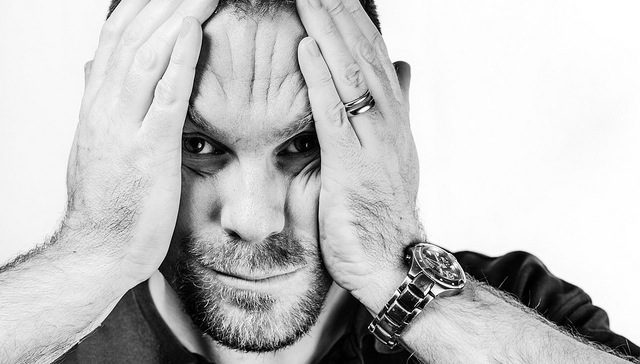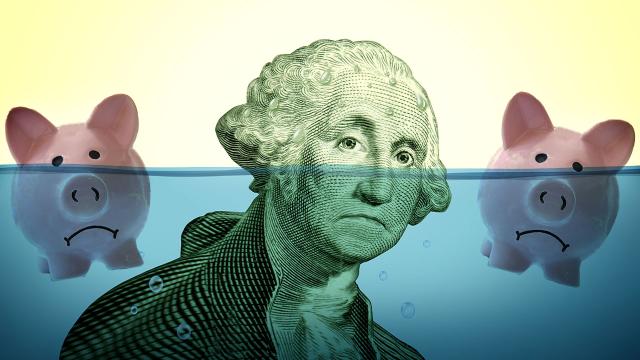During 2004, 2005 and early 2006, I made a lot of feeble attempts at turning our finances around. I’d make these little commitments to myself to stop spending so much money or to start paying off credit cards. It never took very long before those commitments fell apart and, before long, I didn’t even really believe in those commitments.
This post originally appeared on The Simple Dollar
I basically fell into a mindset that I would never really change my financial situation and that somehow in the future some miracle would happen to turn everything around.
Looking back on it, I think there were four key reasons why I was never able to commit to that change.
Four Reasons Nothing Changed

First, I didn’t ever have a real sense that I would lose anything. Although the debt piled up, I never doubted that I would be able to pay the bills. I never had any trouble with them at all until early 2006.
Second, when I was honest about the pros and cons of changing my financial habits, the “pros” seemed to outweigh the “cons”. It’s hard to commit to change if you genuinely feel that the benefits of your current path are better than the benefits of change. There would be times when I would be ashamed of my financial state, but there were many more moments when I enjoyed being able to spend freely.
Third, I didn’t actually fully understand all of the “pros” and “cons” of better spending habits. My impression of frugality was a false and overly negative one. Similarly, I had far too much of my happiness tied up in the things I was buying, so I essentially viewed continuing on my current path as “happy” and change as “sad,” which is completely wrong.
Finally, I believed that my “future self” would just bail me out eventually. I was going to do this and this and that and that and make lots of money and eventually I’d have so much money that all of these issues would go away, so why not spend money now? I banked really hard on my future self earning tons of money, which wasn’t exactly a safe bet. Instead, I was shackling my future self.
When Change Finally Took Place

All four of those things had to come undone before I was really ready for financial change. Here’s how that change happened.
First, I got scared. In April 2006, I reached a point where I truly couldn’t pay my bills. There wasn’t enough cash in the ol’ checking account and my credit cards were at or near their limits. I didn’t know what to do.
Second, I actually learned the truth about frugality and financial competence instead of relying on my own ideas. I read a pile of books on personal finance, frugality and debt repayment and quickly realised that it didn’t have to be miserable. Frugality just means cutting back on the unimportant things in life so that you can afford the important things and maintain some balance.
Third, I started to realise that I valued experiences over stuff. I once collected books, but now I collect books read. I once collected movies, but now I collect movies watched. I’d rather try something new every weekend than just do the same old things, and most of the new things to try out are either cheap or free.
Finally, I woke up to the fact that I was already my “future self”. There wasn’t some magical fairy godmother that was coming to rescue me. Every time I overspent, I was eventually going to have to pay for it and miss out on better opportunities down the road. Spending more money than I should every week on dumb things means a smaller vacation or it means more time spent with the stress of debt. My actions today either increase or decrease my opportunities and choices tomorrow.
Some of these required certain things to happen in my life. You can’t just “do” a financial scare — it happens due to events a bit beyond your control. To an extent, the recognition of the value of experiences takes some time, too.
However, you can actually make the rest of this happen. Nothing is stopping you from learning about personal finance and frugality from sites like this one or from great books like Your Money or Your Life. Nothing is stopping you from spending time reflecting on the long term consequences of your spending decisions. All of those are journeys you can start on at any time — and, if you’re anything like me, they will lead to financial change.
Financial change isn’t just flipping a switch. It requires a lot of ingredients to be in place. Good luck!
When You Repeatedly Fail at Financial Change [The Simple Dollar]
Trent Hamm is a personal finance writer at TheSimpleDollar.com. After pulling himself out of his own financial crisis, he founded the site in late 2006 to help others through financially difficult situations; today the site has become a finance, insurance, and retirement resource. Contact Trent at trent AT the simple dollar DOT com; please send site inquiries to inquiries AT the simple dollar DOT com.
Money picture from Shutterstock. Photos by Stefan Neuweger & Sarah Reid.

Comments